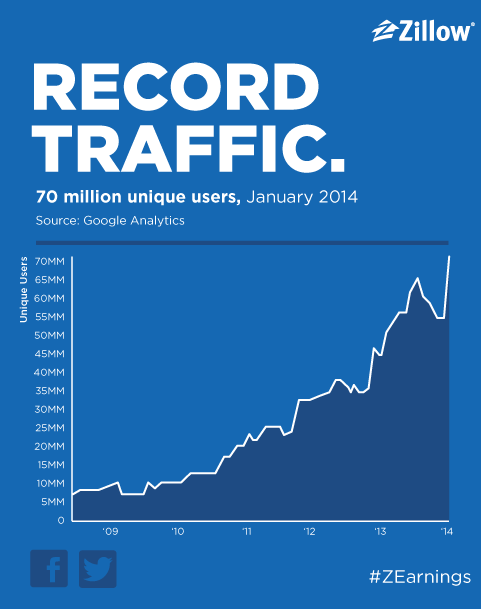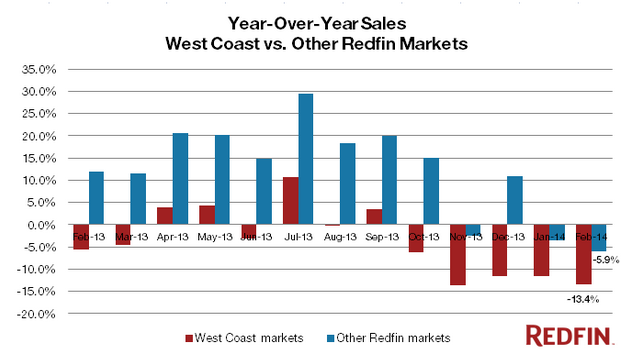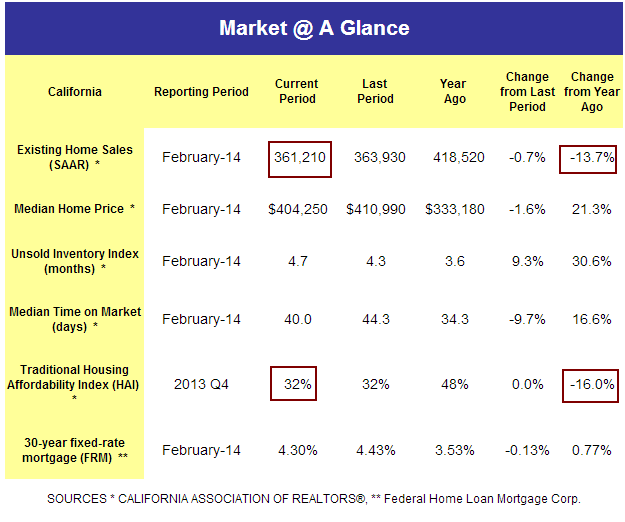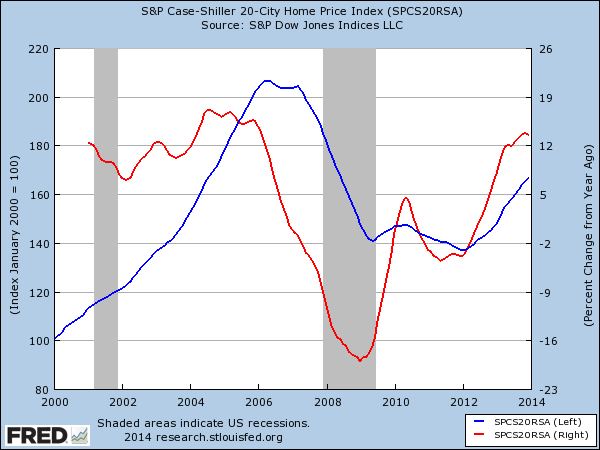What was unimaginable just two decades ago is now a reality. The amount of local real estate data one can get with a click of their mouse is mind boggling. While this can be “net positive” when the real estate market is going up, it can quickly turn into a major nightmare when the real estate market is heading down (as we anticipate it to do over the next few years). An incredibly popular real estate website Zillow.com traffic growth rate just went parabolic, now bringing in over 70 Million unique visitors in January of 2014.
Is that good or bad?
Well, it’s not dissimilar to speculating in penny stocks and hitting refresh button on your browser every few seconds (back in the day). People are starting to watch their local real estate markets very carefully. This is a speculative mentality. While it does wonders on the way up, a lot of people will rush to sell when they see their comps going negative. I am afraid they will find very few (if any) buyers on the other side. Perhaps collapsing the real estate prices much faster than anyone anticipates. We just have to wait and see.
Did you enjoy this article? If so, please share our blog with your friends as we try to get traction. Gratitude!!!
Click here to subscribe to my mailing list
Shocking Secret Revealed: Will Zillow.com Accelerate Upcoming Real Estate Collapse? Google
From our friends at Doctorhousingbubble.com
You can’t stop the internet when it comes to real estate data. Zillow is a great example of technology revolutionizing the way people view real estate. Some of you are old enough to remember when the closely guarded MLS was only accessible by your local real estate agent. Unless you were ready to do some digging, finding out what a home sold for took a bit of time. It was also hard to view a list of available homes for sale. That is no longer the case. When Zillow initially came out the housing bubble was still raging. My initial thought was that access to information would only serve to create bigger booms and deeper busts. Keep in mind that the entire housing system is still built upon the appraisal system. Basically each home is only as good as the last few sales. When a market is booming and people are now able to see the boom in real time the temptation to buy can ramp up. When the boom bursts as it did in 2008, you can also see how quickly things will reverse. Things are already slowing down and sales are dropping dramatically in some areas. Does access to data liberate us from the old model of buying and selling real estate?
The real estate information revolution
I love digging around in the housing data. Real estate by far is going to be the biggest purchase most Americans will ever make. In the past, this big buying decision was usually entrusted to those in the industry. It made sense if the only folks with access to the MLS were real estate agents. They held all the cards. Most people had no idea what homes were for sale until an agent drove them around to view target properties. Now, open houses are posted online and many people arrive agent free.
People are still irrational and that is why markets boom and bust. People had access to great information before the tech meltdown in the early 2000s. Zillow was around in 2006 yet the housing market had its first ever nationwide meltdown starting late in 2007 when data started becoming readily available to all. The housing market has become a speculative asset class that captures the attention of the masses. Entire mythologies are built around real estate. Confirmation bias is extreme in the industry even though we have witnessed 7,000,000 foreclosures since this crisis hit.
The appetite for real estate information is insatiable:
Zillow put out this chart showing the visitors to their site. Back in 2009 Zillow was getting about 5 million unique visitors per month. Today that number is up to 70 million. This is a massive number of people going to a site dedicated to real estate data.
It is important to understand what is going on behind the numbers. Appraisals are largely based on a “sales comparison approach” where recent sales are used as a basis for current pricing. This is great in a market with a high number of transactions and relatively stable price changes but what happens whensales dwindle or inventory flat out disappears? We are seeing some of this occur where some zip codes are reaching new peaks on low sales volume.
Redfin also provides some good data and we can see that sales are taking a hit in the West Coast:
Year-over-year sales in the West Coast are down 13.4 percent versus 5.9 percent nationwide. In California sales are leading the way in this year-over-year decline:
Sales in the state are down 13.7 percent year-over-year and the median home price is up 21.3 percent although this trend has stalled out for the last couple of months. Affordability in California is horrible. Only one out of three families can actually afford the median priced home. The last post was interesting and we see many young professional families with six figure incomes struggling to purchase homes in high priced areas. What is fascinating is that many of these high income households are pausing to buy because they are running the numbers. Numbers that many times are pulled from these new venues of data.
Why are these seemingly intelligent high earners balking at buying when the trend is obviously showing higher prices? I believe one of the larger ironies of having access to data is that it makes people more prone to manias and panics. The late night mantras of “real estate never goes down” or the simple minded retorts of “buying makes sense at any time” are largely lost on a tech savvy audience that can crunch the numbers and understands opportunity costs and can run the numbers on a simple Excel sheet. The days of fooling a large number of people with hollow mantras is largely gone. We can see what is going on simply by typing in a few numbers. However, it is naïve to think that greed, the fuel that sets manias ablaze is also gone.
There is a bigger complexity to the system. Can the Fed really control interest rates for a very long time? Do baby boomers have adequate retirement funds to keep them going into deep old age? With sales slowing down and prices stalling out, will speculators pullback and spook the data hungry mob into changing their tune? The news cycle feeds off of the quick headline so you have to wonder what will happen when the housing market inevitably slows down as it is. Going back to the late 1990s, we have yet to see a stable market for more than a few years. Boom and bust has been the new theme:
Boom and bust seems to be a new trait of the housing market. Access to information only seems to feed the beast or starve the giant. The fact that so many in their 20s and 30s with healthy incomes that put them in the top 10 percent of households are hesitating to buy tells you something. These people want a home but are targeting markets flooded by investors, speculators, and people simply willing to mortgage their lives for a poorly built property. There are 7,000,000 reasons why people should run the numbers carefully and think deeply about making a giant purchase.
It is fascinating to see the number of people being vocal about buying in high priced areas today. This was similar to the rhetoric we saw in 2006 and 2007. Some have sound arguments and others are merely using their own confirmation bias as a way to extrapolate their very unique circumstances onto the future. People seem to crave a social affirmation when buying. Those that are successful usually feel pressure from family, friends, or even their own internal dialogue that buying is simply the next best thing to do. Once they buy, the entire narrative usually develops on how marvelous of a decision it was. Some even mistake luck with market timing acumen. The rental parity argument makes sense with smaller down payments but when we are talking $100,000, $200,000, or even $300,000 for a down payment, this argument falls flat. An all-cash investor doesn’t have to worry about rental parity from day one. Make the down payment large enough and you are likely to arrive at rental parity no matter what. There are bigger things at play. How many can actually save this much? What about the lost opportunity cost in say the stock market? Can someone actually carry this nut 30 years forward? It is interesting to note the volume of e-mails I have gotten in the last couple of years of people asking for confirmation about a buying decision. My response? Go ahead and buy if you feel you absolutely need to! I’m not the one that will carry a $4,000, $5,000, or even $6,000 monthly nut deep into the future.
What is also interesting is the big trend in people opting to rent versus buy. Many have no choice but many that have the ability to buy are opting not to. Some would rather lease a nicer home versus stretching to buy in an overheated market that is creating a halo effect on neighboring cities.
Access to data is great but I think this coupled with the instant media analysis only accentuates the boom and bust cycle of real estate. There is a strong possibility that this year, prices will go negative year-over-year in some areas especially if the slowdown in sales continues. Then the feedback loop will reverse. We have not had a normal real estate market for more than 20 years so why do some think that after this incredible investor induced boom that somehow, we will calmly reach a new permanently high plateau? The biggest argument for higher prices is basically the “because the past had lower prices” group and the “real estate always goes up in good areas” group that largely uses anecdotal stories as a method of ignoring the growing strain on local incomes. I can get behind this rally in home prices if good jobs were plentiful and incomes were moving up in sync with real estate values instead of being driven up byinvestor speculation and Fed market manipulation. It is good to see that those in their 20s and 30s with solid household incomes are actually crunching the numbers instead of mindlessly waddling into a massive housing purchase by following some old tired mantra. Remember kids, it used to be true that “real estate never faced a nationwide price decline” until it did only a few years ago.






